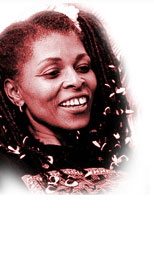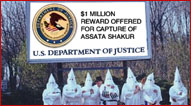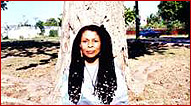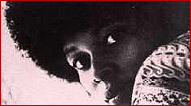


Search Site |
|

|
Assata Shakur: Profiled
and on the run A political activist most of my life, I am an ex-political prisoner who has lived in exile in Cuba since 1984. Although the U.S. government has done everything in its power to criminalize me, I am no criminal, nor have I ever been one. In the 1960s, I participated in the black liberation movement, the student rights movement and the movement to end the war in Vietnam. I also joined the Black Panther Party. By 1969, the Black Panther Party had become the number-one organization targeted by the FBI's COINTELPRO program. Because it demanded the total liberation of Black people, J. Edgar Hoover called it the "greatest threat to the internal security of the country" and vowed to destroy it and its leaders and activists. I was falsely accused in six different "criminal cases," and in all six I was eventually acquitted or the charges were dismissed. But these outcomes did not mean that I received justice in the courts. It only meant that the "evidence" presented against me was so flimsy and false that my innocence became evident. This political persecution was part and parcel of the government's policy of eliminating political opponents by charging them with crimes and arresting them with no regard to the factual basis of such charges. On May 2, 1973, 1, Zayd Malik Shakur and Sundiata Acoli were stopped on the New Jersey Turnpike, supposedly for a "faulty tail light." Sundiata got out of the car to determine why we were stopped. Zayd and I remained in the car. State trooper Harper then came to the car, opened the door and began to question us. Because we were Black and in a car with Vermont license plates, he claimed he became "suspicious." He then drew his gun, pointed it at us and told us to put our hands up in the air, in front of us, so he could see them. I complied, and in a split second there was a sound that came from outside the car, there was a sudden movement and I was shot once with my arms held up in the air and then once again from the back. Zayd and trooper Werner Forester were killed. After being almost fatally wounded, I managed to climb in the back seat of the car to get away from the shooting. Sundiata drove the car five miles down the road, carried me into a grassy area because he was afraid that the police would see the car parked on the side of the road and would start shooting into it again. It was there that I was captured, dragged out of the car, stomped and then left on the ground. Although I drifted in and out of consciousness, I remember clearly, both while I was lying on the ground and while I was in the ambulance, the state troopers repeatedly ask, "Is she dead yet?" I cannot remember, however, how long I was on the ground or how long it was before the ambulance was allowed to leave for the hospital, but in the trial transcript Harper stated that while he was being questioned, some time after 2:00 a.m., that a detective told him that I had just been brought into the hospital. I was the only live "suspect" in custody, and before that time Harper had never told anyone that a woman had shot him. Although Harper admitted that he shot and killed Zayd, I was charged, under the New Jersey felony murder law, with killing both Zayd, who was my closest friend, and Forester. Never in my life have I felt such grief. It was clear that Zayd had lost his life trying to protect me and Sundiata. Although he was also unarmed and the gun that killed Forester was found under Zayd's leg, Sundiata, who was captured later, was also charged with both deaths. On three official reports and during his testimony before the grand jury, Harper stated that he saw me take a gun out of my pocketbook. But he finally admitted under cross-examination that he never saw me with my hands in a pocketbook, never saw me with a weapon inside the car and never saw me shoot him. Moreover, three medical specialists examined me: . A neurologist testified that I was paralyzed immediately after being shot. 2. A surgeon testified that "it was absolutely anatomically necessary that both arms be in the air for Mrs. Chesimard to receive the wounds." The same surgeon also testified that the claim by trooper Harper that I had been crouching in a firing position when I was shot was "totally anatomically impossible." 3. A pathologist testified that "there is no conceivable way that it [the bullet] could have traveled over to hit the clavicle if her arm was down." He said "it was impossible to have that trajectory." The prosecutors presented no medical testimony to refute the above evidence. No evidence was ever presented that I had a 9-millimeter weapon; in fact, New Jersey State Police testified that the 9-millimeter weapon belonged to Zayd based on a holster fitting the weapon that police recovered from his body. No fingerprints or any other evidence linked me to any guns or ammunition. The results of the Neutron Activation test, which could determine whether or not I had fired a weapon, were negative. Neither Sundiata nor I ever received a fair trial. We were both convicted in the news media long before our trials. Not one news-media outlet was ever permitted to interview us, although the New Jersey police and the FBI fed stories to the press on a daily basis. In 1977, I was convicted by an all-White jury and sentenced to life plus 33 years in prison. In 1979, fearing that I would be murdered in prison and knowing that I would never receive any justice, my committed comrades liberated me from prison. In 1978, my case was one of many cases brought before the United Nations Organization in a petition filed by the National Conference of Black Lawyers, the National Alliance Against Racist and Political Repression and the United Church of Christ Commission for Racial Justice. The report exposed the existence of political prisoners in the United States, their political persecution, the cruel and inhuman treatment they receive in U.S. prisons and the FBI's and New York Police Department's role in making me a "shoot-to-kill" target. On December 24, 1997, the state of New Jersey called a press conference to announce that the New Jersey State Police had written a letter to Pope John Paul II asking him to intervene on their behalf and to aid in having me extradited back to New Jersey. The state police refused to make their letter public. Knowing that they had probably distorted the facts and attempted to get the Pope to do the devil's work in the name of religion, I decided to write the Pope to inform him about the reality of "justice" for Black people in New Jersey and in the United States. In January of 1998, during the Pope's visit to Cuba, I agreed to do an interview with NBC journalist Ralph Penza around my letter to the Pope, about my experiences in the New Jersey court system and about the changes I saw in the United States and its treatment of Black people in the last 25 years. I agreed to do this interview because I believed that the letter sent to the Pope was a vicious, vulgar, publicity maneuver on the part of the state police and a cynical attempt to manipulate him. After years of being victimized by the "establishment" media, it was nave of me to hope that I might finally get the opportunity to tell my side of the story. Instead of an interview with me, what took place was a "staged media event" in three parts, full of distortions, inaccuracies and outright lies. DISTORTIONS AND LIES IN THE NBC SERIES In an NBC interview Governor Christie Whitman was quoted as saying that "this has nothing to do with race; this had everything to do with crime." Either Whitman is completely unfamiliar with the facts in my case or her sensitivity to racism and to the plight of Black people and other people of color in the United States is at a subzero level. In 1973, the trial in Middlesex County had to be stopped because of the overwhelming racism expressed in the jury room. The court was finally forced to rule that the entire jury panel had been contaminated by racist comments like "If she's Black, she's guilty." In an obvious effort to prevent us from being tried by "a jury of our peers," the New Jersey courts ordered that a jury be selected from Morris County, New Jersey, where only 2.2 percent of the population were Black and 97.5 percent of potential jurors were White. In a study done in Morris County, one of the wealthiest counties in the country, 92 percent of the registered voters said that they were familiar with the case through the news media, and 72 percent believed we were guilty based on pretrial publicity. During the jury selection process in the county, White supremacists from the National Social White People's Party, wearing swastikas, demonstrated carrying signs reading "SUPPORT WHITE POLICE." The trial was later moved back to Middlesex County, where 70 percent thought I was guilty based on pretrial publicity. The current situation in New Jersey's prisons underlines the racism that dominates the politics of the state of New Jersey. Although the population of the state is approximately 78 percent White, more than 75 percent of its prison population consist of Blacks and Latinos. And 80 percent of the women in Jersey prisons are people of color. These facts regarding the prison population may not seem to reflect racism to Whitman, but they reek of racism to me. She has been campaigning since first elected to double the reward for my capture. In 1994, she appointed Colonel Carl Williams, of the New Jersey State Police, who immediately vowed to make my capture a priority. In 1995, she sought to "match a $25,000 departmental appropriation" sponsored by an "unidentified legislator." I watched a tape of her "testimony" in her interview with NBC. Whitman gave a dramatic, exaggerated version of what happened, but there is no evidence to support her claim that trooper Forester had "four bullets in him at least, and then they got up and, with his own gun, fired two bullets into his head." Whitman not only claimed that she was writing Janet Reno for federal assistance in my capture based on what she saw in the NBC interview, but also claimed that my return to prison should be a condition for "normalizing relations with Cuba." How did I get to be so important that my life can determine the foreign relations between two governments? Anybody who knows anything about New Jersey politics can be certain that her motives are purely political. She, like Torrecelli and several other opportunistic politicians in New Jersey, came to power as part-time lobbyists for the Batista factionsoliciting votes from right-wing Cubans. They want to use my case as a barrier for normalizing relations with Cuba and as a pretext for maintaining the immoral blockade against the Cuban people. In what can only be called deliberate deception and slander, NBC aired a photograph of a woman with a gun in her hand, implying that the woman in the photograph was me. I was not the woman in the photograph. The photograph was taken from a highly publicized case in which I was accused of bank robbery. I insisted on participating in a lineup, during which witnesses selected another woman. And during the trial several witnesses, including the manager of the bank, testified that the woman in that photograph was not me. I was acquitted. NBC aired that photograph on at least five occasions, representing the woman in the photograph as me. How is it possible that the New Jersey State Police, who claims it has a detective working full time on my case; the governor of New Jersey, who claims she reviewed all the "evidence"; or NBC, which has an extensive research department, did not know that the photograph was not me? Even after many people had called in and after a massive fax and email campaign protesting NBC's mutilation of the facts, Penza and NBC continued to broadcast that photograph. Not once have the New Jersey State Police, Whitman or NBC come forth and stated that I was not the woman in the photograph or that I had been acquitted of that charge. Another major lie and distortion was that we had left Forester on the roadside to die. The truth is that there was a major coverup as to what happened on May 2, 1973. Harper testified that he returned to the State Police Headquarters "to seek aid." Tape recordings and police reports made on May 2 prove, however, that he not only gave several conflicting statements about what happened, but also never mentioned the name of Forester or the incident taking place in front of, less than 200 yards away from, headquarters. In an effort to hide his tracks and cover his guilt, Harper said nothing about Forester to his superiors or to his fellow officers. In an obvious maneuver to provoke sympathy for the police, the NBC series juxtaposed my interview with the weeping widow of Forester. Although I can sympathize with her grief, I believe that her appearance was deliberately included to appeal to people's emotions, to blur the facts, to make me look like a villain and to create the kind of lynch-mob mentality that has historically been associated with White women portrayed as victims of Black people. In essence, the supposed interview with me became a forum for the New Jersey State Police, Forester's widow and the obviously hostile commentary of Penza. The two inifiat programs together lasted 3.5 minutes: me, 59 seconds; the widow, 50 seconds; the state police, 38 seconds; and Penza, 68 seconds. Not once in the interview was I ever asked about Zayd, Sundiata or their families. As the interview went on, it was painfully evident that Penza would never see me as a human being. Although I tried to talk about racism and about the victims of government and police repression, it was clear that he was totally uninterested. As I watched Whitman's interview, the one thing that struck me was her "outrage" at my joy about being a grandmother and, as she put it, my "quite nice life" here in Cuba. Although I love the Cuban people and the solidarity they have shown me, the pain of being torn away from everybody I love has been intense. I have never had the opportunity to see or hold my grandchild. If Whitman thinks that 50 years of dealing with racism, poverty, persecution, brutality, prison, underground, exile and blatant lies have been so nice, then I'd be more than happy to let her walk in my shoes for a while so she can get a taste of how it feels. I am a proud Black woman, and I'm not about to get on television and cry for Penza or any other journalist; the way I have suffered in my lifetime, only God can bear witness to. In an interview, Col. Williams talked about asking the federal government to add to the $50,000 reward for my capture. He also talked about seeking "outside money, or something like that, a benefactor, whatever." Now to whom is he looking to "contribute" to that "cause"? The Ku Klux Klan, the neo-Nazi parties, the white militia organizations? But the plot gets even thicker. He says that the money might lure bounty hunters: "There are individuals out there; I guess they call themselves `soldiers of fortune' who might be interested in doing something, in turning her over to us." Well, in the old days they used to call them slave catchers, Crackers or patterrollers; now they are called mercenaries. Neither the governor nor members of the state police say one word about "justice." The level of their moral and ethical bankruptcy is evident in their eagerness to break the law and hire hoodlums, all in the name of "law and order." But you know what gets to me, what makes me truly indignant? With the schools in Paterson, New Jersey, falling down; with areas of Newark looking like a disaster area; with the crack epidemic; with the widespread poverty and unemployment in New Jersey-these so-called honorable citizens want federal funds to help put this "nigger wench" back in her place. They call me the "most wanted woman" in America. I find that ironic. I've never felt very "wanted" before. When it came to jobs, I was never the "most wanted"; when it came to economic opportunities, I was never the most wanted; when it came to decent housing, I was never the most wanted. It seems like the only time Black people are most wanted is when they want to put us in prison. Like most poor people in the United States, I have no voice. The Black press and the progressive media, as well as Black civil rights organizations, have historically played an essential role in the struggle for social justice. We should continue and expand that tradition. We should create media outlets that help to educate our people and our children, and not annihilate their minds. I am only one woman. I own no TV stations or radio stations or newspapers. But I believe that people need to be educated as to what is going on and to understand the connection between the news media and the instruments of repression in America. All I have are my voice, my spirit and the will to tell the truth. But I sincerely ask those of you in the Black media, those of you in the progressive media and those of you who believe in truth and freedom to publish my story. We have no voice, so you must be the voice of the voiceless. Assata Shakur Havana, Cuba Copyright Crisis Publishing Company, Incorporated Nov/Dec 2000 |



